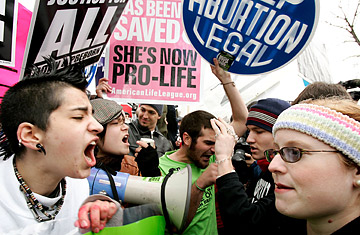
Pro-choice activists, left, argue with pro-life activists in front of the U.S. Supreme Court on Jan. 23, 2006
Should government-subsidized health coverage pay for abortion procedures? For more than three decades, that question had seemed pretty much settled. The Hyde Amendment, passed by the House on Sept., 30, 1976, forbade Medicaid — a program for poor people, jointly administered by Washington and the states, which had, up till then, paid for about 300,000 abortions a year — from using any federal money to pay for the procedure. All but 17 states followed suit, banning use of their own funds as well; with a few modifications, the ban has stood up ever since.
The prospect of sweeping health reform, however, has reopened the issue. While current versions of the legislation do not address the abortion issue at all, late last month, 19 antiabortion Democrats in the House sent a letter to Speaker Nancy Pelosi, warning that they "cannot support any health-care-reform proposal unless it explicitly excludes abortion from the scope of any government-defined or subsidized health-insurance plan." Among those who signed the letter were two members of the House Energy and Commerce Committee (one of the three panels with principal jurisdiction in the health-reform effort): Bart Stupak of Michigan and Charlie Melancon of Louisiana.
"The health-care-reform package produced by Congress will be landmark," the Democratic lawmakers wrote, "and with legislation as important as this, abortion must be addressed clearly in the bill text." Pelosi's office is negotiating with the lawmakers to find some way to accommodate their concerns, but thus far, they haven't found one.
Indeed, the abortion question is just one of a myriad of tricky questions that will emerge from the fine print as the health debate moves forward. Democratic leaders say, for example, that they are already prepared to accede to Republican demands that illegal immigrants be excluded from the plan. But other issues, such as abortion, are going to be far more difficult to navigate.
If an explicit ban on abortion coverage were imposed, say sources involved in writing the legislation on Capitol Hill, it could have much further-reaching implications than the Hyde Amendment ever did. It could, in fact, have the effect of denying abortion coverage to women who now receive it under their private insurance plans. Nearly 90% of insurers cover abortion procedures, according to a 2002 survey by the Guttmacher Institute, a nonprofit organization whose statistics are relied upon by both sides of the abortion debate.
Under the legislation being worked on by three committees in the House, Americans earning up to 400% of the poverty level — $43,000 for an individual; $88,000 for a family of four — would be eligible for government subsidies to help them purchase coverage. But if the antiabortion legislators get their way, those subsidies would have a big string attached; they could not be used to purchase a policy that has abortion coverage. For many women, that would mean giving up a benefit they now have under their private insurance policies. And it would raise all sorts of other questions if insurers were allowed to discriminate among their customers based on whether or not they are using federal dollars to pay for their policies.
Abortion-rights advocacy groups are pushing back. On July 6, the National Women's Law Center (NWLC) released a poll of 1,000 likely voters conducted by the Mellman Group indicating that 71% favor including reproductive services such as birth control and abortion as part of health reform. The poll also found that 75% believe an independent commission should determine what medical services are covered among the basic benefits offered under health reform. (Congress is also considering giving that power to the Health and Human Services Secretary.) Said NWLC vice president Judy Waxman: "Congress should refrain from practicing medicine and instead let medical professionals determine what health-care services will be included in a benefits package."
